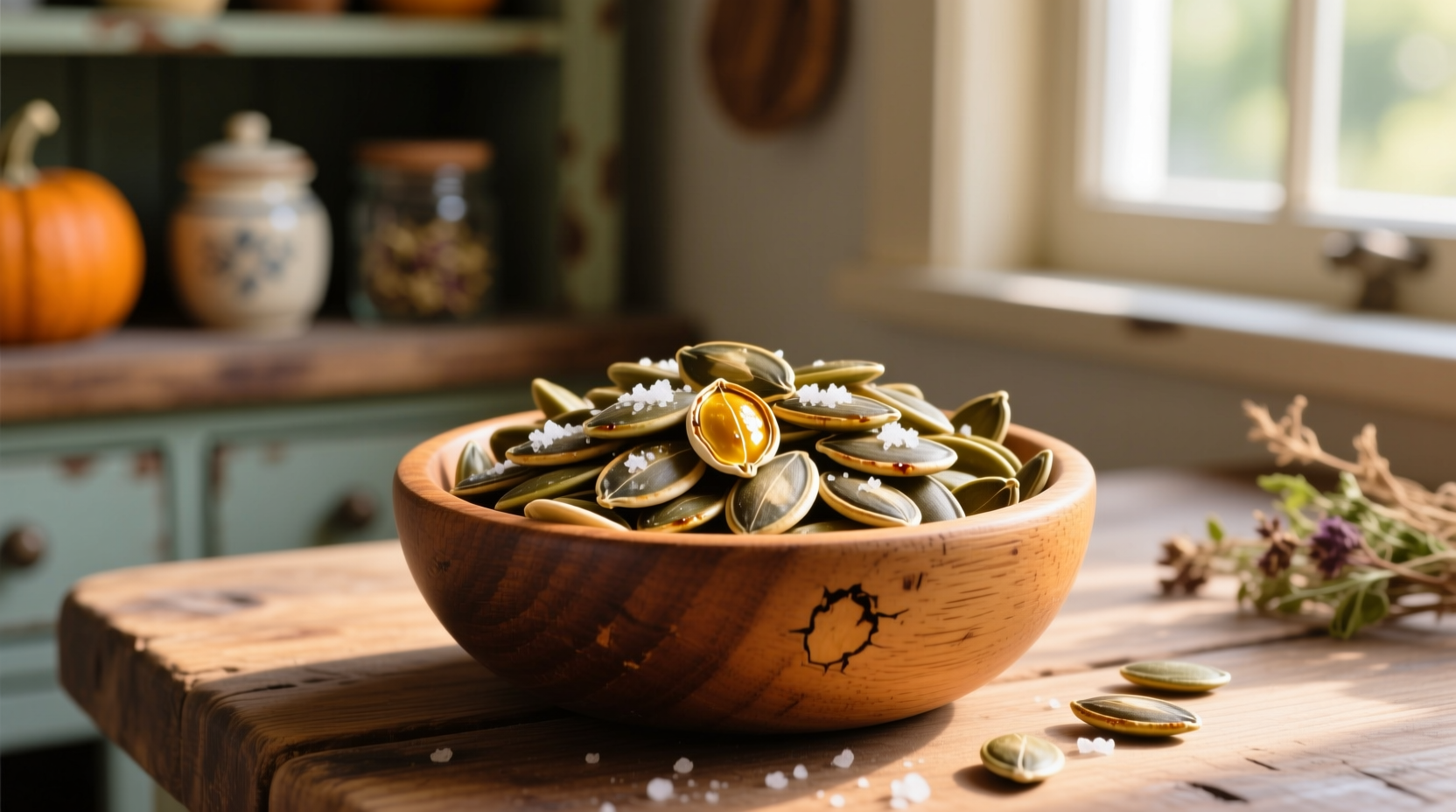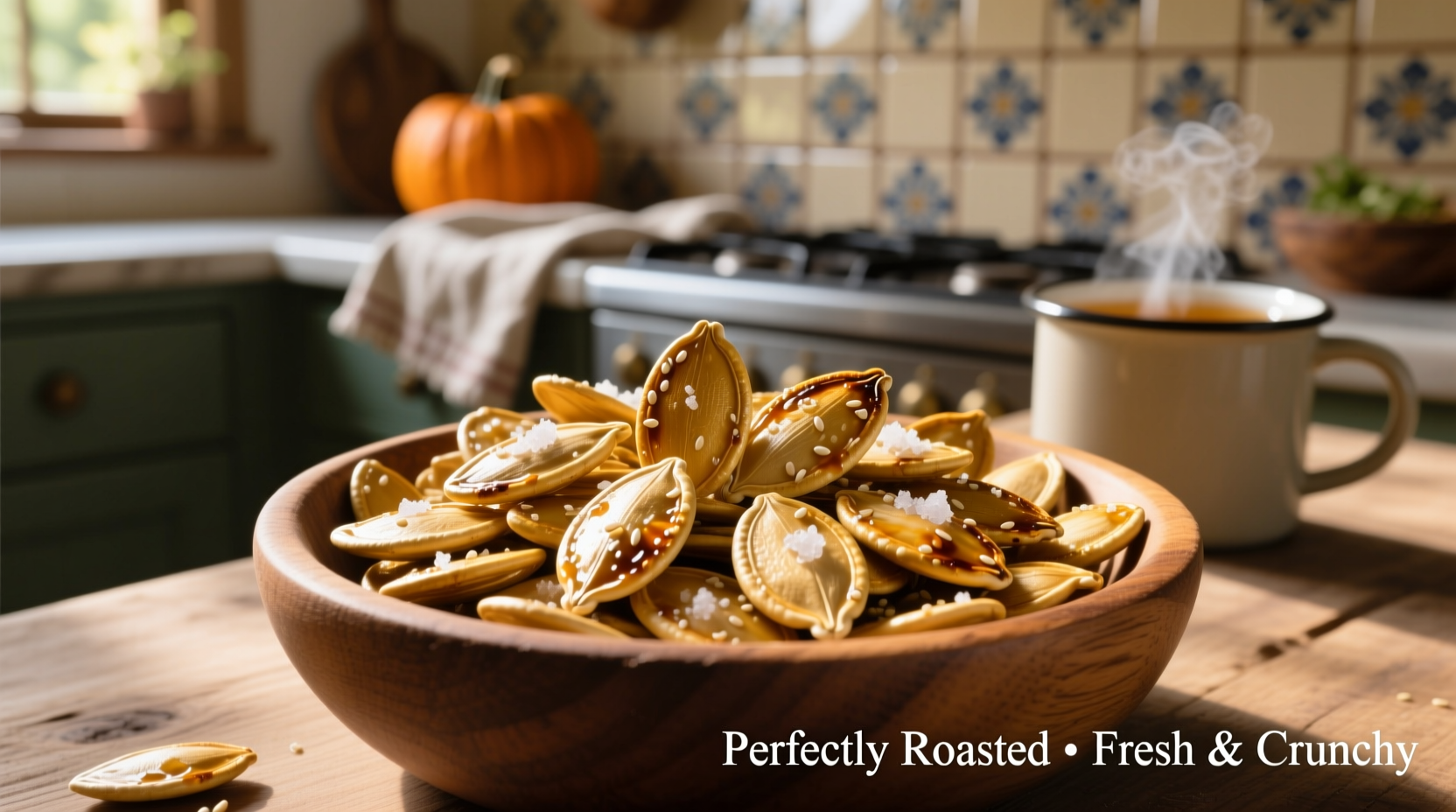Yes, pumpkin seeds (pepitas) are not only safe to eat but packed with essential nutrients like magnesium, zinc, and healthy fats. A single ounce (28g) provides 150 calories, 7g protein, and significant amounts of magnesium (18% DV) and zinc (14% DV), making them an excellent addition to a balanced diet for heart health, blood sugar control, and better sleep.
Why Pumpkin Seeds Deserve a Spot in Your Pantry
Often scooped out and discarded during Halloween carving, pumpkin seeds are actually a nutritional powerhouse waiting to be discovered. These small, flat, oval-shaped seeds come from pumpkins and other winter squash varieties, with the hull-less Cucurbita pepo varieties producing the green "pepitas" most commonly sold for eating. Unlike seeds with hard white shells, pepitas require no cracking and can be enjoyed raw or roasted with minimal preparation.
Nutritional Profile That Stands Out
Pumpkin seeds aren't just a seasonal treat—they're a year-round superfood with a remarkable nutritional composition. Let's examine what makes them so valuable:
| Nutrient | Per 1 oz (28g) | % Daily Value |
|---|---|---|
| Calories | 151 | 8% |
| Protein | 7g | 14% |
| Fat | 13g | 17% |
| Magnesium | 151mg | 37% |
| Zinc | 2.2mg | 20% |
| Iron | 2.1mg | 12% |
| Fiber | 1.7g | 6% |
Data sourced from USDA FoodData Central shows that pumpkin seeds contain a unique combination of nutrients that work synergistically for health benefits. The magnesium content is particularly impressive—just one serving provides over a third of your daily needs, crucial for muscle function, blood pressure regulation, and energy production.
Science-Backed Health Benefits You Can Trust
Research published in the Nutrition Research and Practice journal confirms that regular consumption of pumpkin seeds is associated with several health improvements. The high magnesium content helps regulate blood pressure, while the zinc supports immune function and wound healing. A 2020 review in Antioxidants highlighted pumpkin seeds' rich antioxidant profile, including phenolic compounds and tocopherols that combat oxidative stress.
For men's health, studies from the National Center for Complementary and Integrative Health suggest pumpkin seed oil may help reduce symptoms of benign prostatic hyperplasia (BPH). Women experiencing menopause may find relief from hot flashes and improved urinary function according to research in Climacteric.

How to Prepare Pumpkin Seeds for Maximum Flavor
Whether you're using seeds from your carved jack-o'-lantern or store-bought pepitas, proper preparation unlocks their full potential:
Cleaning and Drying Process
For fresh pumpkin seeds: Separate seeds from pulp, rinse thoroughly in a colander, then spread on a clean kitchen towel. Pat dry and let air-dry for several hours or overnight. For quicker results, spread on a baking sheet and dry in an oven at the lowest setting (170°F/75°C) for 30-60 minutes.
Perfect Roasting Techniques
Roasting enhances flavor and texture while preserving nutrients. Try these methods:
- Oven method: Toss 1 cup seeds with 1 tsp oil and seasonings. Spread on parchment-lined baking sheet. Bake at 300°F (150°C) for 30-40 minutes, stirring occasionally until golden.
- Stovetop method: Heat 1 tsp oil in skillet over medium-low. Add seeds and 1/4 tsp salt. Stir constantly for 5-8 minutes until puffed and golden.
- Air fryer method: Toss seeds with oil and seasonings. Cook at 300°F (150°C) for 10-12 minutes, shaking basket halfway through.
Flavor Variations to Try
Experiment with these seasoning combinations for different culinary experiences:
- Classic savory: 1 tsp sea salt + 1/2 tsp garlic powder + 1/4 tsp smoked paprika
- Sweet & spicy: 1 tsp maple syrup + 1/2 tsp cinnamon + pinch of cayenne
- Herb garden: 1 tsp dried rosemary + 1/2 tsp thyme + 1/4 tsp lemon zest
Creative Ways to Enjoy Pumpkin Seeds Daily
Incorporating pumpkin seeds into your routine is easier than you think. Nutritionists recommend a daily serving of 1-2 ounces (28-56g) for optimal benefits. Here's how to make them part of your regular diet:
Simple Daily Additions
Start with these effortless integration methods:
- Top your morning yogurt or oatmeal with a tablespoon of raw or roasted seeds
- Add to salads for crunch instead of croutons
- Mix into trail blends with dried fruit and other nuts
- Stir into soups just before serving for texture contrast
Recipe Transformations
Elevate your cooking with these seed-enhanced dishes:
- Seed-crusted proteins: Replace breadcrumbs with finely ground pumpkin seeds for chicken or fish
- Energy bites: Blend seeds with dates, cocoa, and nut butter for no-bake snacks
- Homemade granola: Add during the last 5 minutes of baking to prevent burning
- Green pesto: Substitute half the pine nuts with pumpkin seeds for a budget-friendly version
Storage Tips for Maximum Freshness
Pumpkin seeds contain healthy fats that can turn rancid if not stored properly. Follow these guidelines:
- Store raw seeds in an airtight container in the refrigerator for up to 3 months
- Roasted seeds keep for 2-3 weeks at room temperature in sealed containers
- For long-term storage, freeze seeds in vacuum-sealed bags for up to 1 year
- Add oxygen absorbers to storage containers to extend shelf life
Signs of spoilage include a bitter taste, rancid smell, or visible mold. When in doubt, discard the seeds.
Important Considerations for Safe Consumption
While pumpkin seeds are generally safe for most people, certain considerations apply:
- Calorie density: At 150 calories per ounce, practice portion control if managing weight
- Allergies: Though rare, seed allergies do occur—discontinue use if experiencing symptoms
- Medication interactions: High magnesium content may interact with certain antibiotics and blood pressure medications
- Digestive sensitivity: Start with small portions if you have IBS or digestive issues
The U.S. Food and Drug Administration confirms pumpkin seeds are Generally Recognized As Safe (GRAS) for consumption, with no established upper intake limits for healthy adults.











 浙公网安备
33010002000092号
浙公网安备
33010002000092号 浙B2-20120091-4
浙B2-20120091-4